Fleurs du Mal Magazine


Or see the index

She Walks in Beauty
She walks in beauty, like the night
Of cloudless climes and starry skies;
And all that’s best of dark and bright
Meet in her aspect and her eyes:
Thus mellow’d to that tender light
Which heaven to gaudy day denies.
One shade the more, one ray the less,
Had half impair’d the nameless grace
Which waves in every raven tress,
Or softly lightens o’er her face;
Where thoughts serenely sweet express
How pure, how dear their dwelling-place.
And on that cheek, and o’er that brow,
So soft, so calm, yet eloquent,
The smiles that win, the tints that glow,
But tell of days in goodness spent,
A mind at peace with all below,
A heart whose love is innocent.
Lord Byron
(1788 – 1824)
She Walks in Beauty
• fleursdumal.nl magazine
More in: Archive A-B, Archive A-B, Byron, Lord
Mary Shelley verblijft op haar veertiende bij een familie in Schotland, waar een innige vriendschap ontstaat met Isabella Baxter.
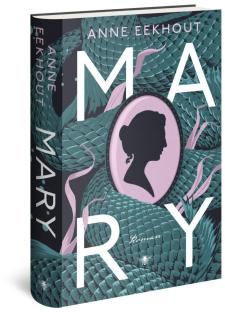 Samen dwalen ze in het gebied dat al eeuwen verhalen herbergt over monsters en geesten, en op een dag stuiten ze diep in het bos op een man die geen man is. De ledematen log en lelijk, een hoofd dat noch menselijk, noch dierlijk is.
Samen dwalen ze in het gebied dat al eeuwen verhalen herbergt over monsters en geesten, en op een dag stuiten ze diep in het bos op een man die geen man is. De ledematen log en lelijk, een hoofd dat noch menselijk, noch dierlijk is.
Vier jaar later brengt Mary met haar geliefde Percy Shelley een bezoek aan haar vrienden John Polidori en Lord Byron, bij het Meer van Genève. ’s Avonds bij het haardvuur vertellen ze elkaar verhalen. Een flintertje herinnering brengt haar terug naar haar tijd met Isabella in Schotland, en ook naar David Booth, een zeer intelligente, charismatische, maar tegelijk ook griezelige man, die een grote interesse in Mary en Isabella ontwikkelde. Dan dient ook het monster uit het bos zich weer aan, en vanuit die gedachte ontstaat haar verhaal over het monster van Frankenstein.
Mary is een ode aan de verbeelding, een verhaal over creëren, over de onlosmakelijke band tussen fantasie en werkelijkheid. En evenals Mary Shelley toont Anne Eekhout de kracht van een vrouw wanneer die iets ter wereld brengt wat niemand voor mogelijk had gehouden.
Anne Eekhout debuteerde in 2014 met de roman Dogma, die werd genomineerd voor de Bronzen Uil voor het beste debuut, op de longlist stond van de AKO Literatuurprijs en die wordt vertaald in het Duits. In 2016 verscheen Op een nacht (genomineerd voor de BNG Literatuurprijs) en in 2019 Nicolas en de verdwijning van de wereld, dat de prijs voor het Beste Boek voor Jongeren won. In november 2021 verschijnt de roman Mary waarin met verbluffende verbeeldingskracht de achttienjarige schepper van het meesterwerk Frankenstein tot leven wordt gewekt.
# new novel
Mary
Auteur: Anne Eekhout
Type: Gebonden
ISBN: 9789403153315
NUR: 301
Aantal pagina’s: 384
Uitgever: De Bezige Bij
Verschijningsdatum: 18-11-2021
Prijs: 24,99
• fleursdumal.nl magazine
More in: #Biography Archives, - Book News, - Bookstores, Archive E-F, Archive S-T, Byron, Byron, Lord, Keats, Keats, John, Mary Shelley, Percy Byssche Shelley, Shelley, Shelley, Mary, Shelley, Percy Byssche
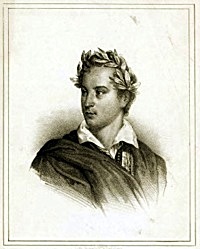
And Wilt Thou Weep When I Am Low ?
And wilt thou weep when I am low?
Sweet lady! speak those words again:
Yet if they grieve thee, say not so—
I would not give that bosom pain.
My heart is sad, my hopes are gone,
My blood runs coldly through my breast;
And when I perish, thou alone
Wilt sigh above my place of rest.
And yet, methinks, a gleam of peace
Doth through my cloud of anguish shine:
And for a while my sorrows cease,
To know thy heart hath felt for mine.
Oh lady! blessd be that tear—
It falls for one who cannot weep;
Such precious drops are doubly dear
To those whose eyes no tear may steep.
Sweet lady! once my heart was warm
With every feeling soft as thine;
But Beauty’s self hath ceased to charm
A wretch created to repine.
Yet wilt thou weep when I am low?
Sweet lady! speak those words again:
Yet if they grieve thee, say not so—
I would not give that bosom pain.
George Gordon Byron
(1788 – 1824)
And Wilt Thou Weep When I Am Low ?
(Poem)
• fleursdumal.nl magazine
More in: Archive A-B, Archive A-B, Byron, Lord
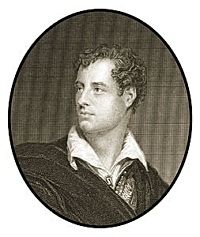
Thy Days Are Done
Thy days are done, thy fame begun;
Thy country’s strains record
The triumphs of her chosen Son,
The slaughter of his sword!
The deeds he did, the fields he won,
The freedom he restored!
Though thou art fall’n, while we are free
Thou shalt not taste of death!
The generous blood that flow’d from thee
Disdain’d to sink beneath:
Within our veins its currents be,
Thy spirit on our breath!
Thy name, our charging hosts along,
Shall be the battle-word!
Thy fall, the theme of choral song
From virgin voices pour’d!
To weep would do thy glory wrong:
Thou shalt not be deplored.
George Gordon Byron
(1788 – 1824)
Thy Days Are Done
(Poem)
• fleursdumal.nl magazine
More in: Archive A-B, Archive A-B, Byron, Lord
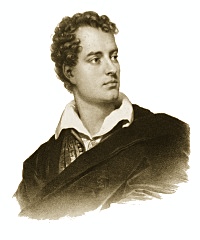
Oh! Snatched Away in Beauty’s Bloom
Oh! snatched away in beauty’s bloom,
On thee shall press no ponderous tomb;
But on thy turf shall roses rear
Their leaves, the earliest of the year;
And the wild cypress wave in tender
gloom:
And oft by yon blue gushing stream
Shall sorrow lean her drooping head,
And feed deep thought with many a dream,
And lingering pause and lightly tread;
Fond wretch! as if her step disturbed the
dead!
Away! we know that tears are vain,
That death nor heeds nor hears distress:
Will this unteach us to complain?
Or make one mourner weep the less?
And thou – who tell’st me to forget,
Thy looks are wan, thine eyes are wet.
George Gordon Byron
(1788 – 1824)
Oh! Snatched Away in Beauty’s Bloom
(Poem)
• fleursdumal.nl magazine
More in: Archive A-B, Archive A-B, Byron, Lord

So we’ll go no more a roving
So we’ll go no more a roving
So late into the night,
Though the heart be still as loving,
And the moon be still as bright.
For the sword outwears its sheath,
And the soul wears out the breast,
And the heart must pause to breathe,
And Love itself have rest.
Though the night was made for loving,
And the day returns too soon,
Yet we’ll go no more a roving
By the light of the moon.
George Gordon Byron
(1788 – 1824)
So we’ll go no more a roving
(Poem)
• fleursdumal.nl magazine
More in: Archive A-B, Archive A-B, Byron, Lord
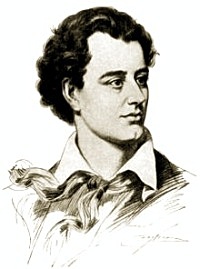
By the Rivers of Babylon
We Sat Down and Wept
1
We sat down and wept by the waters
Of Babel, and thought of the day
When our foe, in the hue of his slaughters,
Made Salem’s high places his prey;
And ye, oh her desolate daughters!
Were scattered all weeping away.
2
While sadly we gazed on the river
Which rolled on in freedom below,
They demanded the song; but, oh never
That triumph the stranger shall know!
May this right hand be withered for ever,
Ere it string our high harp for the foe!
3
On the willow that harp is suspended,
Oh Salem! its sound should be free;
And the hour when thy glories were
ended
But left me that token of thee:
And ne’er shall its soft tones be blended
With the voice of the spoiler by me!
George Gordon Byron
(1788 – 1824)
By the Rivers of Babylon We Sat Down and Wept
(Poem)
• fleursdumal.nl magazine
More in: Archive A-B, Archive A-B, Byron, Lord

Remind me not, remind me not
Remind me not, remind me not,
Of those beloved, those vanish’d hours,
When all my soul was given to thee;
Hours that may never be forgot,
Till Time unnerves our vital powers,
And thou and I shall cease to be.
Can I forget—canst thou forget,
When playing with thy golden hair,
How quick thy fluttering heart did move?
Oh! by my soul, I see thee yet,
With eyes so languid, breast so fair,
And lips, though silent, breathing love.
When thus reclining on my breast,
Those eyes threw back a glance so sweet,
As half reproach’d yet rais’d desire,
And still we near and nearer prest,
And still our glowing lips would meet,
As if in kisses to expire.
And then those pensive eyes would close,
And bid their lids each other seek,
Veiling the azure orbs below;
While their long lashes’ darken’d gloss
Seem’d stealing o’er thy brilliant cheek,
Like raven’s plumage smooth’d on snow.
I dreamt last night our love return’d,
And, sooth to say, that very dream
Was sweeter in its phantasy,
Than if for other hearts I burn’d,
For eyes that ne’er like thine could beam
In Rapture’s wild reality.
Then tell me not, remind me not,
Of hours which, though for ever gone,
Can still a pleasing dream restore,
Till Thou and I shall be forgot,
And senseless, as the mouldering stone
Which tells that we shall be no more.
George Gordon Byron
(1788 – 1824)
Remind me not, remind me not
(Poem)
• fleursdumal.nl magazine
More in: Archive A-B, Archive A-B, Byron, Lord

It is the hour
It is the hour when from the boughs
The nightingale’s high note is heard;
It is the hour — when lover’s vows
Seem sweet in every whisper’d word;
And gentle winds and waters near,
Make music to the lonely ear.
Each flower the dews have lightly wet,
And in the sky the stars are met,
And on the wave is deeper blue,
And on the leaf a browner hue,
And in the Heaven that clear obscure
So softly dark, and darkly pure,
That follows the decline of day
As twilight melts beneath the moon away.
George Gordon Byron
(1788 – 1824)
It is the hour
(Poem)
• fleursdumal.nl magazine
More in: Archive A-B, Archive A-B, Byron, Lord
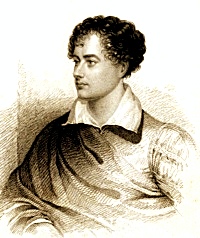
Euthanasia
When Time, or soon or late, shall bring
The dreamless sleep that lulls the dead,
Oblivion! may thy languid wing
Wave gently o’er my dying bed!
No band of friends or heirs be there,
To weep, or wish, the coming blow:
No maiden, with dishevelled hair,
To feel, or feign, decorous woe.
But silent let me sink to earth,
With no officious mourners near:
I would not mar one hour of mirth,
Nor startle friendship with a tear.
Yet Love, if Love in such an hour
Could nobly check its useless sighs,
Might then exert its latest power
In her who lives, and him who dies.
‘Twere sweet, my Psyche! to the last
Thy features still serene to see:
Forgetful of its struggles past,
E’en Pain itself should smile on thee.
But vain the wish?for Beauty still
Will shrink, as shrinks the ebbing breath;
And women’s tears, produced at will,
Deceive in life, unman in death.
Then lonely be my latest hour,
Without regret, without a groan;
For thousands Death hath ceas’d to lower,
And pain been transient or unknown.
`Ay, but to die, and go,’ alas!
Where all have gone, and all must go!
To be the nothing that I was
Ere born to life and living woe!
Count o’er the joys thine hours have seen,
Count o’er thy days from anguish free,
And know, whatever thou hast been,
‘Tis something better not to be.
George Gordon Byron
(1788 – 1824)
Euthanasia
(Poem)
• fleursdumal.nl magazine
More in: Archive A-B, Archive A-B, Byron, Lord

I Speak Not
I speak not, I trace not, I breathe not thy name;
There is grief in the sound, there is guilt in the fame;
But the tear that now burns on my cheek may impart
The deep thoughts that dwell in that silence of heart.
Too brief for our passion, too long for our peace,
Were those hours – can their joy or their bitterness cease?
We repent, we abjure, we will break from our chain, –
We will part, we will fly to – unite it again!
Oh! thine be the gladness, and mine be the guilt!
Forgive me, adored one! – forsake if thou wilt;
But the heart which is thine shall expire undebased,
And man shall not break it – whatever thou may’st.
And stern to the haughty, but humble to thee,
This soul in its bitterest blackness shall be;
And our days seem as swift, and our moments more sweet,
With thee at my side, than with worlds at our feet.
One sigh of thy sorrow, one look of thy love,
Shall turn me or fix, shall reward or reprove.
And the heartless may wonder at all I resign –
Thy lips shall reply, not to them, but to mine.
George Gordon Byron
(1788 – 1824)
I Speak Not
(Poem)
• fleursdumal.nl magazine
More in: Archive A-B, Archive A-B, Byron, Lord

Farewell!
If Ever Fondest Prayer
Farewell! if ever fondest prayer
For other’s weal availed on high,
Mine will not all be lost in air,
But waft thy name beyond the sky.
‘Twere vain to speak, to weep, to sigh:
Oh! more than tears of blood can tell,
When wrung from guilt’s expiring eye,
Are in that word – Farewell! – Farewell!
These lips are mute, these eyes are dry;
But in my breast and in my brain,
Awake the pangs that pass not by,
The thought that ne’er shall sleep again.
My soul nor deigns nor dares complain,
Though grief and passion there rebel;
I only know we loved in vain –
I only feel – Farewell! – Farewell!
George Gordon Byron
(1788 – 1824)
Farewell! If Ever Fondest Prayer
(Poem)
• fleursdumal.nl magazine
More in: Archive A-B, Archive A-B, Byron, Lord
Thank you for reading Fleurs du Mal - magazine for art & literature